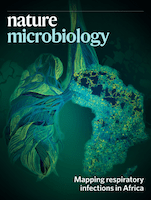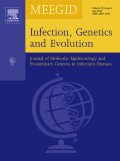
Molecular Genetics Microbiology and Virology
Scope & Guideline
Advancing the Frontiers of Molecular Science
Introduction
Aims and Scopes
- Molecular Mechanisms of Pathogenicity:
The journal emphasizes research on the molecular mechanisms through which pathogens, including bacteria and viruses, interact with host systems, leading to disease. This includes studies on gene expression, protein interactions, and virulence factors. - Antimicrobial Resistance:
A significant focus is placed on understanding the genetic basis of antimicrobial resistance in various pathogens. This includes investigations into genetic mutations, resistance gene identification, and the mechanisms that confer resistance. - Viral Genetics and Evolution:
Research on the genetic diversity, evolution, and adaptation of viruses is a core area. This encompasses studies on mutations, phylogenetic analysis, and the impact of genetic variation on transmissibility and virulence. - Biotechnological Applications:
The journal also covers innovative biotechnological approaches, such as the use of recombinant DNA technologies, CRISPR/Cas9 applications, and vaccine development, particularly in relation to infectious diseases. - Microbial Ecology and Interactions:
Exploration of microbial communities, their interactions, and their roles in health and disease is a critical area. This includes studies on the human microbiome and its influence on various health conditions.
Trending and Emerging
- COVID-19 and Related Research:
Research related to COVID-19, including studies on SARS-CoV-2 mutations, vaccine development, and long-term effects of the virus, has surged. This reflects the global health priority and the need for ongoing research into viral pandemics. - Non-Coding RNA in Pathogenesis:
An increasing interest in the role of non-coding RNAs, particularly in relation to cancer and viral infections, is evident. This emerging area explores how non-coding RNAs regulate gene expression and contribute to disease mechanisms. - Multiplex and Rapid Diagnostic Techniques:
There is a growing focus on advanced diagnostic techniques, such as multiplex PCR, that allow for the rapid identification of multiple pathogens. This trend underscores the need for efficient disease detection methods in clinical settings. - Genetic Engineering and Synthetic Biology:
The journal is witnessing a rise in publications related to genetic engineering techniques and synthetic biology applications, particularly in developing novel therapeutic strategies and understanding genetic modifications. - Environmental Microbiology and Pathogen Surveillance:
Emerging themes also include environmental microbiology, focusing on pathogen surveillance in various ecosystems, which is becoming increasingly important in understanding disease transmission in changing environments.
Declining or Waning
- Historical Viral Pathogenesis Studies:
Research focusing on historical aspects of viral pathogenesis appears to be declining. While understanding past viral outbreaks is important, the current emphasis is more on emerging viral threats and their genetic characteristics. - Traditional Antibiotic Development:
There seems to be a decrease in publications dedicated solely to traditional antibiotic development, as the field shifts towards understanding resistance mechanisms and alternative therapeutic approaches. - General Virology without Specific Focus:
There is a noticeable reduction in general virology studies that do not target specific viruses or emerging threats. The journal is increasingly prioritizing research that addresses contemporary and pressing viral challenges.
Similar Journals

Virulence
Unlocking Insights into Infectious Disease MechanismsVirulence, a leading academic journal published by Taylor & Francis Inc, is dedicated to advancing the understanding of virulence mechanisms in pathogens across various infectious diseases. Since becoming an Open Access publication in 2018, it has broadened the accessibility of cutting-edge research for a global audience, promoting collaboration and knowledge-sharing among researchers, professionals, and students alike. With a significant impact within its field, the journal boasts impressive 2023 quartile rankings: Q2 in Immunology and Q1 in both Infectious Diseases and Microbiology, alongside notable standings in Parasitology. The current Scopus rankings reinforce its prominence, with high percentiles indicating its influence and relevance in advancing scientific inquiry. Covering a period from 2010 to 2024, Virulence serves as an essential platform for innovative research that not only addresses the critical challenges in understanding pathogen behavior but also contributes towards global health solutions, establishing it as a vital resource in the rapidly evolving fields of immunology, microbiology, and parasitology.

Nature Microbiology
Advancing the Frontiers of Microbial ScienceNature Microbiology is a premier journal published by NATURE PORTFOLIO that has firmly established itself within the realms of microbiological research since its inception in 2016. Based in the United Kingdom, this prestigious journal specializes in the intricacies of applied microbiology, cell biology, genetics, immunology, and medical microbiology, making it a cornerstone for academics and professionals alike. With an impressive Scopus ranking placing it in the top tier across various relevant categories—such as rank #3 in Genetics and #2 in Applied Microbiology—it underscores the journal’s commitment to high-quality, impactful research. Although it operates under a subscription model, Nature Microbiology's broad Open Access policy facilitates greater dissemination and visibility for its authors. The journal's objectives are centered around publishing cutting-edge advancements that enhance our understanding of microbial life, its interactions, and applications in health and disease. As a Q1 journal across multiple disciplines, it holds immense significance for researchers, professionals, and students enthusiastic about the latest innovations and breakthroughs in microbiology.

Microorganisms
Championing high-quality research in microbiology.Microorganisms is a leading open-access journal published by MDPI based in Switzerland, catering specifically to the rapidly evolving fields of microbiology and virology. Since its inception in 2013, the journal aims to foster the dissemination of high-quality research through its comprehensive and interdisciplinary platform, with a particular focus on both fundamental and applied microbiological sciences. Contributing to its esteemed reputation, Microorganisms holds a commendable Q2 ranking in the categories of Microbiology and Virology, as well as in Medical Microbiology, highlighting its significance in the academic community. With a consistent impact, evidenced by its rankings in Scopus—such as rank #25 in Virology and #56 in Microbiology—the journal serves as an invaluable resource for researchers, professionals, and students looking to stay at the forefront of microbiological research. As an open-access journal, Microorganisms ensures that vital research findings are readily available to a global audience, promoting collaboration and innovation in the study of microbial life and its implications for health and disease.

RUSSIAN JOURNAL OF GENETICS
Delving into the Depths of Genetic ScienceRUSSIAN JOURNAL OF GENETICS is a significant platform in the field of genetics, published by PLEIADES PUBLISHING INC since its inception in 1996. With an ISSN of 1022-7954 and an E-ISSN of 1608-3369, the journal focuses on a wide array of topics within genetics, providing researchers, professionals, and students with insights into advancements and discoveries in this ever-evolving discipline. While it currently holds a Q4 ranking in the 2023 Genetics category according to Scopus, representing invaluable opportunities for knowledge dissemination, the journal is actively working to enhance its impact in future rankings. Readers will find the journal a repository of diverse genetic research findings, methodologies, and theoretical advancements. Although it is not an open-access journal, it is committed to serving the academic community through rigorous peer-reviewed articles. With a consistent publication trajectory spanning to 2024, the RUSSIAN JOURNAL OF GENETICS remains a crucial resource for those aspiring to stay at the forefront of genetic research and applications.

JOURNAL OF BASIC MICROBIOLOGY
Driving Discoveries in Basic MicrobiologyJOURNAL OF BASIC MICROBIOLOGY is a premier publication in the field of microbiology, published by WILEY since 1985. With a significant presence in Germany, this journal encompasses a wide spectrum of research topics, focusing on applied microbiology and biotechnology as well as diverse areas within medicine. Holding a commendable Q2 ranking in both its categories for 2023, it plays a crucial role in disseminating innovative findings and methodologies to the community. Researchers will find it to be an essential platform for sharing high-quality work, where it currently stands at rank #47 in the applied microbiology and biotechnology category, representing the 63rd percentile among international journals. The JOURNAL OF BASIC MICROBIOLOGY caters to a growing audience of professionals and students, offering insights essential for advancement in microbiological research and its applications. While it does not currently offer an Open Access option, it remains an influential outlet for academic excellence, continuously contributing to the development of the field through its rigorous peer-reviewed articles.

MOLECULAR MICROBIOLOGY
Exploring the Interactions that Shape LifeMOLECULAR MICROBIOLOGY is a prestigious academic journal published by Wiley that has been at the forefront of research in the fields of microbiology and molecular biology since its inception in 1987. With an impressive Q1 rating in Microbiology and a Q2 rating in Molecular Biology for 2023, this journal serves as a vital platform for disseminating high-impact research that advances our understanding of microbial processes and interactions at the molecular level. The journal's ISSN is 0950-382X, and the E-ISSN is 1365-2958, making it easily accessible to a global audience of researchers, professionals, and students. Though not an Open Access journal, MOLECULAR MICROBIOLOGY remains committed to providing valuable insights and fostering knowledge exchange in the academic community. Situated in the United Kingdom and indexed in prominent databases like Scopus, the journal holds a strong standing, with current rankings reflecting its influential role in the academic landscape. Researchers in the field are invited to contribute and engage with cutting-edge discoveries that will shape the future of microbiological sciences.

ARCHIVES OF MICROBIOLOGY
Exploring the Depths of Microbial DiversityThe Archives of Microbiology, published by Springer, is a reputable journal in the field of microbiology, serving as a vital platform for the dissemination of groundbreaking research and critical reviews since its inception in 1974. With an ISSN of 0302-8933 and an E-ISSN of 1432-072X, this journal operates out of Germany and maintains a global reach, promoting high-quality scholarship across multiple disciplines, including biochemistry, genetics, and molecular biology, as evidenced by its Q2 ranking in Medicine (miscellaneous) and consistent Q3 placements in other categories in 2023. Although the journal does not offer open access options, its rigorous peer-review process ensures that published articles are of the highest standard, making it an essential resource for researchers, professionals, and students keen on advancing their understanding of microbial sciences. As the journal converges toward 2024, it remains committed to fostering innovative microbiological research and facilitating interdisciplinary dialogue within the scientific community.

PLASMID
Unraveling gene function through innovative research.PLASMID is a prestigious academic journal published by Academic Press Inc Elsevier Science that focuses on the dynamic field of molecular biology, particularly in the study of plasmids and their roles in gene function and expression. Since its inception in 1977, the journal has built a robust reputation, currently holding a Q3 category ranking in Molecular Biology and positioning itself within the 34th percentile based on Scopus metrics, making it a valuable resource for researchers and professionals alike. With an ISSN of 0147-619X and E-ISSN 1095-9890, PLASMID offers a wealth of articles that delve into cutting-edge research, facilitating knowledge-sharing and inspiring innovations in the field. Although it does not operate under an open-access model, the journal remains committed to advancing scholarly communication and maintaining high standards of academic rigor. Researchers and students engaged in biochemistry, genetics, and molecular biology will find PLASMID to be an essential platform for disseminating their findings and exploring novel ideas.

TRENDS IN MICROBIOLOGY
Exploring the Dynamics of Infectious DiseasesTRENDS IN MICROBIOLOGY is a premier academic journal published by CELL PRESS, renowned for its high-impact research contributions in the fields of microbiology, infectious diseases, medical microbiology, and virology. With an impressive impact factor and a notable Scopus ranking—placing it in the top tiers of its categories, including a remarkable Q1 status in multiple disciplines—this journal is essential for researchers, professionals, and students aiming to stay at the forefront of innovative microbial research and ongoing advancements in pathogen biology. Since its inception in 1993, TRENDS IN MICROBIOLOGY has provided a platform for thought-provoking reviews and critical insights, fostering discussions that shape the future of the microbiological sciences. Based in the United Kingdom, TRENDS IN MICROBIOLOGY continues to lead the way in disseminating vital knowledge within the global scientific community.

INFECTION GENETICS AND EVOLUTION
Transforming Understanding of Pathogen-Host InteractionsINFECTION GENETICS AND EVOLUTION is a premier scholarly journal published by Elsevier, focusing on the dynamic field of infection genetics and evolutionary biology. Since its inception in 2001, this journal has emerged as a critical platform for the dissemination of cutting-edge research, bridging the gap between molecular genetics, evolutionary theory, and infectious disease study. With an influence profound enough to secure its status in the Q1 category for Ecology, Evolution, Behavior and Systematics and impressive Q2 rankings in Genetics, Infectious Diseases, and Microbiology, the journal offers researchers unparalleled insights that advance the understanding of pathogen evolution and host interactions. Despite the lack of Open Access, the research published in this journal significantly contributes to the academic discourse and informs public health approaches. By publishing high-quality studies and reviews through 2024, INFECTION GENETICS AND EVOLUTION remains indispensable for academics, professionals, and students seeking to explore the intricate mechanisms of infection and adaptation in various organisms.